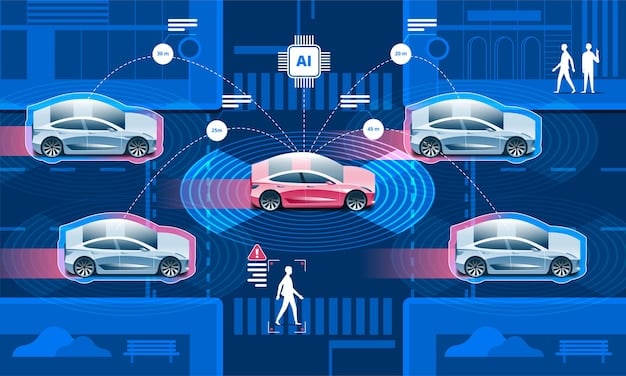New Data Privacy Law for Autonomous Vehicles Proposed in the US

Breaking: New Legislation Proposed to Regulate Data Privacy in Autonomous Vehicles in the US aims to establish clear guidelines on the collection, storage, and use of data generated by self-driving cars, addressing growing concerns about privacy and security.
The rise of autonomous vehicles promises increased safety and convenience, but also raises significant concerns about data privacy. Now, breaking: New Legislation Proposed to Regulate Data Privacy in Autonomous Vehicles is on the horizon, aiming to address these challenges head-on.
Autonomous Vehicle Data Privacy: A Legislative Push
The increasing prevalence of autonomous vehicles (AVs) has sparked a critical debate on data privacy. These vehicles are equipped with a multitude of sensors, cameras, and software that collect vast amounts of data. This data includes driving behavior, location information, and even potentially personal information about passengers and pedestrians. The proposed legislation seeks to establish clear rules about how this data can be collected, used, and shared, ensuring that individual privacy rights are protected.

What Data Do Autonomous Vehicles Collect?
Understanding the types of data collected by AVs is crucial to grasping the scope of the privacy concerns. This data falls into several categories, each presenting unique challenges:
- Location Data: AVs constantly track their location, providing detailed records of where the vehicle has been and when.
- Driving Behavior: Data on speed, acceleration, braking patterns, and other driving behaviors are continuously recorded.
- Sensor Data: Information from cameras, lidar, radar, and other sensors captures a comprehensive view of the vehicle’s surroundings.
- In-Cabin Recordings: Some AVs may record audio and video within the vehicle’s cabin for safety or monitoring purposes.
The aggregation of this data can create a detailed profile of individuals and their habits, raising concerns about potential misuse or unauthorized access.
The proposed regulation aims to mitigate these risks by setting limits on data collection, requiring transparency about data usage, and granting individuals greater control over their data. It encourages companies to prioritize privacy-enhancing technologies such as data anonymization and differential privacy.
Key Provisions of the Proposed Data Privacy Legislation
The proposed legislation includes several key provisions designed to safeguard data privacy in the context of autonomous vehicles. These provisions address various aspects of data handling, from collection and storage to usage and sharing.
Data Minimization and Purpose Limitation
One of the core principles of the legislation is data minimization, which requires AV manufacturers and operators to collect only the data that is strictly necessary for a specific and legitimate purpose. This prevents the indiscriminate collection of data that could potentially be misused. Purpose limitation further restricts the use of collected data to the originally stated purpose, preventing it from being used for unrelated or unforeseen purposes.
- Limited Collection: Companies can only collect data essential to the vehicle’s operation.
- Specific Use: Data usage is limited to the reasons it was originally collected for.
- Transparency: Users must be informed about what data is collected and why.
These provisions aim to strike a balance between enabling the functionality of AVs and protecting individuals from unwarranted surveillance.
The new rules also emphasizes the importance of informing individuals about the types of data collected, the purposes for which it is used, and their rights regarding access, rectification, and deletion of their data.
Enforcement and Accountability Mechanisms
Effective enforcement is crucial to ensuring that data privacy regulations are not merely aspirational but are actually followed in practice. The proposed legislation includes robust enforcement mechanisms and accountability measures to deter non-compliance and provide remedies for privacy violations.

Establishing a Regulatory Body
The legislation proposes the creation of a dedicated regulatory body responsible for overseeing data privacy compliance in the autonomous vehicle sector. This body would have the authority to conduct audits, investigate complaints, and impose penalties for violations.
- Regular Audits: Scheduled checks to ensure data practices comply with the law.
- Complaint Investigation: A system for individuals to report and resolve privacy breaches.
- Penalties: Fines and other sanctions for companies that violate the law.
This regulatory body would play a critical role in enforcing the legislation and ensuring that companies are held accountable for their data handling practices.
The enforcement mechanisms also include provisions for private rights of action, allowing individuals who have been harmed by privacy violations to sue for damages. This creates an additional layer of accountability and incentivizes companies to prioritize data privacy compliance.
Industry Response and Potential Challenges
The proposed data privacy legislation has elicited mixed reactions from the autonomous vehicle industry. While many companies acknowledge the importance of data privacy and support the general principles of the legislation, some have raised concerns about potential challenges and unintended consequences.
Balancing Innovation and Regulation
One of the key challenges is striking the right balance between promoting innovation in the AV sector and protecting data privacy. Some industry representatives argue that overly strict regulations could stifle innovation and slow down the development and deployment of autonomous vehicles.
Companies worry about additional costs and regulatory burdens imposed by the complexity of the law. There is also the concern that ambiguous language in the legislation could make the companies vulnerable to lawsuits.
Others argue that strong data privacy protections are essential for building public trust in AVs and fostering their widespread adoption. Consumers are more likely to embrace autonomous vehicles if they are confident that their data will be handled responsibly and securely.
Some companies are exploring ways to minimize data collection, anonymize data, and implement strong security measures to protect user privacy. Open-source privacy tools may be a viable option as well.
Global Implications and Cross-Border Data Flows
Data privacy is not just a domestic issue; it has significant global implications, particularly in the context of cross-border data flows. The proposed legislation must address how data collected by autonomous vehicles in the US can be transferred to and processed in other countries, ensuring that privacy rights are protected regardless of where the data is handled.
Harmonizing Data Privacy Standards
One of the challenges is harmonizing data privacy standards across different jurisdictions. The US does not have a comprehensive federal data privacy law like the European Union’s General Data Protection Regulation (GDPR). This can create complexities when data is transferred between the US and countries with stricter privacy laws.
The regulation must be adaptable to accommodate any future data privacy legislation passed, and should be able to work in conjunction with the GDPR should the data be used in the EU.
- International Agreements: Should work to establish clear guidelines for data transfers.
- Data Localization: Consider requirements for local data storage.
- Data Minimization: Strict minimization policies reduce the amount of data transferred internationally.
The legislation should also address the issue of data access by foreign governments, ensuring that appropriate safeguards are in place to prevent unauthorized access to personal data.
Future Trends and Emerging Technologies
The data privacy landscape is constantly evolving, driven by emerging technologies and changing societal expectations. The proposed legislation must be forward-looking and adaptable to address future trends and challenges in the autonomous vehicle sector.
The Role of Artificial Intelligence
Artificial intelligence (AI) plays a crucial role in the operation of autonomous vehicles, but it also raises new data privacy concerns. AI algorithms require vast amounts of data to train and improve, potentially leading to the collection of even more data from AVs.
There must be strong regulations in place to ensure AI algorithms are fair, transparent, and do not discriminate against certain groups.
- Algorithmic Transparency: Explain how AI makes decisions to build trust.
- Bias Detection: Continuously monitor AI systems for unfair biases.
- Data Security: Implement advanced encryption technologies to safeguard data.
The legislation should also address the use of AI in data anonymization techniques, ensuring that these techniques are effective and do not inadvertently re-identify individuals.
| Key Aspect 🔑 | Brief Description 📝 |
|---|---|
| Data Minimization 🗂️ | Collecting only necessary data for specified purposes, reducing privacy risks. |
| Enforcement Body 👮 | A regulatory agency to oversee compliance and address privacy violations. |
| Global Implications 🌐 | Addressing data transfer and harmonization of privacy across borders. |
| AI and Privacy 🤖 | Ensuring AI algorithms are transparent, fair, and do not compromise privacy. |
Frequently Asked Questions
▼
Autonomous vehicles collect location data, driving behavior data, sensor data, and in-cabin recordings, creating detailed profiles that raise privacy concerns.
▼
Key provisions include data minimization, purpose limitation, transparency, and enhanced user control over their personal data collected by AVs.
▼
A dedicated regulatory body will oversee compliance, conduct audits, investigate complaints, and impose penalties for violations of data privacy.
▼
The legislation must address cross-border data flows and harmonize data privacy standards with countries like those in the EU to protect international data.
▼
The legislation aims to ensure AI algorithms are transparent, fair, and unbiased, with continuous monitoring and advanced encryption technologies to protect data.
Conclusion
The proposed legislation to regulate data privacy in autonomous vehicles represents a crucial step towards ensuring that the benefits of this technology are not achieved at the expense of individual privacy rights. By establishing clear guidelines for data collection, usage, and sharing, the legislation seeks to build public trust in AVs and foster their responsible development and deployment.





